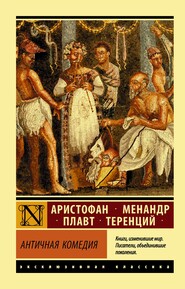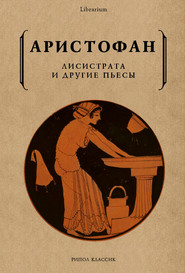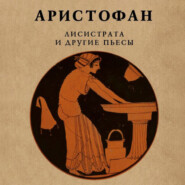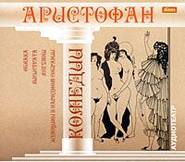По всем вопросам обращайтесь на: info@litportal.ru
(©) 2003-2024.
✖
The Eleven Comedies, Volume 1
Автор
Год написания книги
2018
Настройки чтения
Размер шрифта
Высота строк
Поля
383
The mina was equivalent to about Ł3 10s.
384
Which is the same thing, since a mina was worth a hundred drachmae.
385
For cottabos see note above, p. 177. [Footnote 287. Transcriber.]
386
Syrmaea, a kind of purgative syrup much used by the Egyptians, made of antiscorbutic herbs, such as mustard, horse-radish, etc.
387
As wine-pots or similar vessels.
388
These verses and those which both Trygaeus and the son of Lamachus quote afterwards are borrowed from the 'Iliad.'
389
Boulomachus is derived from [Greek: boulesthai] and [Greek: mach_e] to wish for battle; Clausimachus from [Greek: klaein] and [Greek: mach_e], the tears that battles cost. The same root, [Greek: mach_e], battle, is also contained in the name Lamachus.
390
A distich borrowed from Archilochus, a celebrated poet of the seventh century B.C., born at Paros, and the author of odes, satires, epigrams and elegies. He sang his own shame. 'Twas in an expedition against Saďs, not the town in Egypt as the similarity in name might lead one to believe, but in Thrace, that he had cast away his buckler. "A mighty calamity truly!" he says without shame. "I shall buy another."
391
At Athens more than anywhere the festivals of Bacchus (Dionysus) were celebrated with the utmost pomp—and also with the utmost licence, not to say licentiousness.
Pan–the rustic god and king of the Satyrs; his feast was similarly an occasion of much coarse self-indulgence.
Aphrodité Colias—under this name the goddess was invoked by courtesans as patroness of sensual, physical love. She had a temple on the promontory of Colias, on the Attic coast—whence the surname.
The Genetyllides were minor deities, presiding over the act of generation, as the name indicates. Dogs were offered in sacrifice to them—presumably because of the lubricity of that animal.
At the festivals of Dionysus, Pan and Aphrodité women used to perform lascivious dances to the accompaniment of the beating of tambourines. Lysistrata implies that the women she had summoned to council cared really for nothing but wanton pleasures.
392
An obscene double entendre; Calonicé understands, or pretends to understand, Lysistrata as meaning a long and thick "membrum virile"!
393
The eels from Lake Copaďs in Boeotia were esteemed highly by epicures.
394
This is the reproach Demosthenes constantly levelled against his Athenian fellow-countrymen—their failure to seize opportunity.
395
An island of the Saronic Gulf, lying between Magara and Attica. It was separated by a narrow strait—scene of the naval battle of Salamis, in which the Athenians defeated Xerxes—only from the Attic coast, and was subject to Athens.
396
A deme, or township, of Attica, lying five or six miles north of Athens. The Acharnians were throughout the most extreme partisans of the warlike party during the Peloponnesian struggle. See 'The Acharnians.'
397
The precise reference is uncertain, and where the joke exactly comes in. The Scholiast says Theagenes was a rich, miserly and superstitious citizen, who never undertook any enterprise without first consulting an image of Hecaté, the distributor of honour and wealth according to popular belief; and his wife would naturally follow her husband's example.
398
A deme of Attica, a small and insignificant community—a 'Little Pedlington' in fact.
399
In allusion to the gymnastic training which was de rigueur at Sparta for the women no less than the men, and in particular to the dance of the Lacedaemonian girls, in which the performer was expected to kick the fundament with the heels—always a standing joke among the Athenians against their rivals and enemies the Spartans.
400
The allusion, of course, is to the 'garden of love,' the female parts, which it was the custom with the Greek women, as it is with the ladies of the harem in Turkey to this day, to depilate scrupulously, with the idea of making themselves more attractive to men.
401
Corinth was notorious in the Ancient world for its prostitutes and general dissoluteness.
402
An Athenian general strongly suspected of treachery; Aristophanes pretends his own soldiers have to see that he does not desert to the enemy.
403
A town and fortress on the west coast of Messenia, south-east part of Peloponnese, at the northern extremity of the bay of Sphacteria—the scene by the by of the modern naval battle of Navarino—in Lacedaemonian territory; it had been seized by the Athenian fleet, and was still in their possession at the date, 412 B.C., of the representation of the 'Lysistrata,' though two years later, in the twenty-second year of the War, it was recovered by Sparta.
404
The Athenian women, rightly or wrongly, had the reputation of being over fond of wine. Aristophanes, here and elsewhere, makes many jests on this weakness of theirs.
405
The lofty range of hills overlooking Sparta from the west.











